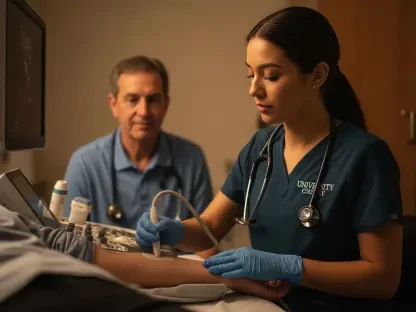In the evolving landscape of healthcare, The Clinic by Cleveland Clinic has been at the forefront, utilizing telehealth innovations to bridge significant gaps in access to medical services. These advancements are particularly crucial for patients residing in rural areas, medical deserts, or those experiencing difficulties traveling due to age, disabilities, or severe pain. Complex systems and the scarcity of specialized physicians in certain regions can make it overwhelmingly challenging for patients to receive proper care, especially regarding second opinions for intricate conditions.
Addressing Healthcare Challenges with Telehealth
Bridging the Gap for Patients in Underserved Areas
The current healthcare landscape poses notable challenges and disparities, especially in regions with limited access to specialized medical care. Patients in these locations often face significant hurdles in obtaining second opinions necessary for complex conditions like cancer, heart diseases, or neurological disorders. The intricate nature of these ailments demands expertise that isn’t readily available in all geographic regions, leading patients to either forgo essential care or travel long distances. By leveraging telehealth, The Clinic by Cleveland Clinic has addressed this critical issue, offering virtual second opinions from top specialists, thereby alleviating the need for arduous travel.
Since its inception in January 2020, The Clinic’s telehealth program has catered predominantly to the U.S. market, focusing on a wide array of conditions. Through virtual consultations facilitated by platforms like Amwell, patients gain access to expert advice without leaving their homes. This flexibility is particularly beneficial for those living in rural or isolated areas. The use of video visits ensures that patients receive a level of interaction comparable to in-person consultations. Yet, recognizing the variability in broadband access and patient preferences, The Clinic has also accommodated those who prefer or require written reports or phone calls, thereby ensuring inclusivity in its approach.
Shifting Diagnoses and Treatment Plans
The impact of The Clinic’s telehealth initiatives has been substantial, with significant changes observed in patient diagnoses and treatment plans. One striking statistic is that in 25% of cases, diagnoses have been revised after obtaining a Cleveland Clinic expert’s second opinion. This underscores the importance of access to specialized knowledge that might not be present in local medical facilities. Furthermore, treatment plans have been altered in an impressive 75% of cases, which demonstrates the potential for telehealth to markedly influence patient outcomes positively.
These changes have not only enhanced the quality of care but have also opened up new treatment avenues for patients previously deemed inoperable. For instance, individuals diagnosed with complex heart conditions or advanced cancers often face bleak prognoses from local specialists. However, virtual consultations with Cleveland Clinic experts have provided alternative treatment strategies, including non-invasive or less invasive options, that have proved viable for many patients. By altering the course of treatment, telehealth has given hope to those facing severe health challenges, fundamentally changing their medical journeys.
Cost Savings and Efficiency
Reducing Healthcare Costs for Patients and Insurers
In addition to improving patient outcomes, The Clinic’s telehealth program has revealed substantial cost savings for both patients and insurance companies. On average, treatment modifications suggested through virtual consultations save approximately $12,000 per patient. This statistic is particularly significant when considering the financial burden of healthcare in the United States. Musculoskeletal conditions, in particular, have shown even greater savings, with some consults reducing costs by as much as $36,000 due to the elimination of unnecessary surgeries.
These financial benefits extend beyond individual savings, impacting the broader healthcare economy by reducing unnecessary procedures and hospital stays. For insurers, the cost-effectiveness of telehealth translates into lower premiums and overall expenditures. For patients, this means a reduced financial strain, allowing for more accessible and affordable healthcare. The ripple effect of these savings is profound with potential reinvestments in other areas of healthcare, further enhancing the quality of services provided.
Enhancing Accessibility for Continued Treatment
Looking forward, The Clinic aims to broaden its reach by establishing direct contracts with payers and employers, further integrating telehealth into regular healthcare plans. This strategy will enable more cost-effective care provisions, as payers could offer essentially free or significantly reduced-cost consultations to their members. Some insurance plans are already incorporating travel benefits, covering air travel, and hotel costs for those who opt for follow-up care in Cleveland Clinic locations, indicating a commitment to holistic patient support.
Additionally, The Clinic is exploring the expansion into remote management of chronic diseases, responding to a frequent request from patients who seek continued treatment beyond initial second opinions. Although current regulatory constraints prevent direct treatment of patients, efforts are underway to introduce this component in the near future. By doing so, The Clinic aspires to provide comprehensive care management remotely, addressing chronic conditions seamlessly through telehealth platforms, thereby transforming the patient care paradigm.
Future Directions and Innovations
Expanding Telehealth Services
The future of telehealth at The Clinic by Cleveland Clinic looks promising, with plans to expand services further and integrate telehealth into broader healthcare management. The ongoing development of remote chronic disease management is a testament to The Clinic’s commitment to innovation and patient-centered care. Addressing chronic diseases remotely would cater to the growing need for consistent, long-term treatment plans, allowing patients to manage their health conditions more effectively without frequent in-person visits.
Notably, such expansions will involve overcoming regulatory barriers and establishing robust digital infrastructures. As telehealth continues to evolve, so too will the technological and regulatory landscapes, ensuring that high-quality care remains accessible to all patients. This evolution will likely include enhanced telehealth platforms, incorporating advanced technologies such as artificial intelligence and machine learning to provide personalized and predictive healthcare solutions. These advancements will ensure that The Clinic remains at the cutting edge of medical care delivery, offering unparalleled expertise and accessibility.
Commitment to Patient-Centered Care
In the rapidly changing world of healthcare, The Clinic by Cleveland Clinic is leading the way by leveraging telehealth innovations to address significant gaps in access to medical services. These advancements are especially vital for patients living in rural areas, medical deserts, or those who struggle to travel due to age, disabilities, or severe pain. The complex healthcare system and the lack of specialized physicians in many regions can make it exceedingly difficult for patients to get the proper care they need, particularly when it comes to obtaining second opinions for complicated conditions. Telehealth allows patients to connect with top-tier medical specialists without the need to travel long distances, thereby democratizing access to expert healthcare. By doing so, The Clinic by Cleveland Clinic ensures that more patients, regardless of their location or physical limitations, receive the high-quality medical attention they deserve. This initiative not only alleviates the burden on patients but also optimizes healthcare resources and improves overall health outcomes.









